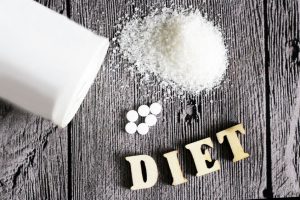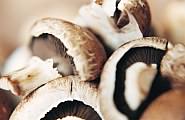
I am often asked if the sugar alcohols are a safer sugarless alternative.
I usually answer with “well yes, but not really.”
Xylitol is used a lot in sugar-free products (specifically in gum), but what is Xylitol, really.
Xylitol is a naturally occurring sweetener found in raspberries, strawberries, plums, corn, endive, and mushrooms. Our bodies actually produce xylitol daily as a metabolic process involving the intestines.
Hum. If that’s the case, it MUST be safe. This is where the yes comes from. Now, below is where the not really comes from – human interference.
The Manufacturing of Xylitol

The processing of Xylitol is where the problems begin.
Xylitol is manufactured by extracting xylan from birch wood or corn cobs, and it is forced to react in the lab with water to produce xylose or “wood sugar.”
Hydrogen (H2) is then added to replicate and “create Xylitol.”
Now, Xylitol is no longer simply found in mushrooms – it’s altered in the lab.

1891
So, when and where was xylitol discovered?
Wood sugar xylose was first hydrogenated into Xylitol in 1891 by the German chemist Emil Fischer.
Since the 1960s, Xylitol has been used in the Soviet Union, Germany, Switzerland and Japan as a preferred sweetener for diabetics.
In these countries, Xylitol is also used intravenously for patients with impaired glucose tolerance, i.e. for trauma, burns, and in diabetic and insulin resistance.
Xylitol’s dental benefits were first studied in Finland in the early 1970s. Researchers at Turku University showed that Xylitol prevented dental caries (cavities).
How Xylitol Is Different From Other Sweeteners
Xylitol is a sugar alcohol. Chemically, sucrose (sugar), fructose, sorbitol, and glucose all have 6 carbon atoms in their molecules. Xylitol has 5 carbon atoms in its molecule.
What does this mean? Well, 6 carbon molecules can be easily digested by oral bacteria but a 5-carbon molecule has strong chemical bonds that are very difficult for bacteria to digest.
So, when Xylitol is consumed, these bacteria starve out and decline. This is one way Xylitol helps prevent plaque and cavities, and why it is a better choice for sugarless gum.
Xylitol has the same sweetness as sugar but with 40% less calories. And, Xylitol’s properties are similar to sugar; it dissolves slower at cold temperatures but faster than sugar above 86 degrees F.
And as a side note, remember that aspartame breaks down at 86 degrees F, releasing toxic methanol into your body.
Coincidence?
Not really. Your body has a systematic pattern in place.
Go figure.
Side Effects

Sorry to burst your bubble, but Xylitol does have a down-side, as do all of the isolated sugar alcohols.
Xylitol is generally well tolerated, but some people experience digestive side effects when they consume too much. This is common in children, too.
Sugar alcohols can pull water into your intestines, and they can be fermented by your gut bacteria.
Heads up if you have Candida.
Hence, eating Xylitol can cause gas, bloating, and diarrhea for some people
So, is Xylitol really a better sugar-free choice as a sweetener, especially in chewing gum? Probably yes, but at the end of the day, you are better off using the real thing, or no sugar at all.
Especially for children. And if you notice any stomach issues.
If you want to learn more about the diet sweeteners, Join my Private Inner Circle. I have written all about the sugar alcohols in my books on the diet sweeteners.
Gain access to all of my online programs, ongoing support, monthly Q&A, and more by joining my Private Inner Circle Membership Program. I look forward to supporting you on your journey to alternative health and wellness.
_____________
Disclaimer: This article is for informational purposes only, and is educational in nature. The FDA may not have evaluated some of the statements. This article is not intended to diagnose, treat, cure, or prevent any disease. Please discuss with your own, qualified health care provider before adding supplements or making any changes to your dietary program.
Before taking vitamins, consult your doctor; pre-existing medical conditions or medications you are taking can affect how your body responds to multivitamins.